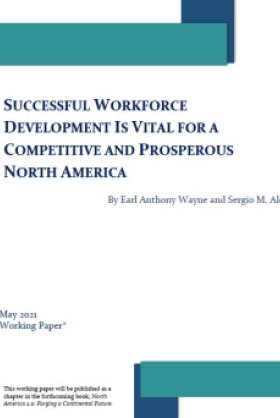Successful Workforce Development Is Vital for a Competitive and Prosperous North America



The successful implementation of a North American Workforce Development Agenda depends on joint collaboration and multistakeholder involvement among national and subnational governments, businesses, academia, and other relevant groups, including unions and nongovernmental organizations (NGOs). The three governments should identify and work to scale up successful partnerships and programs already underway across the continent. This collaboration might best start by building on the needs of sectors of particular importance in existing production networks that link the economies, such as the vehicle sector, and those of emerging importance such as “greener” energy production. By sharing workforce solutions, North America will be able to strengthen its critical coproduction and value chains and bolster its ability to compete in a global marketplace, including against powerhouses like China, while helping the continent’s workers.
This policy brief is part of our series "North America 2.0: Forging a Continental Future". The policy briefs will be released individually and published as a volume in 2021.
Authors

Former Career Ambassador to Afghanistan, Argentina, and Mexico; Distinguished Diplomat in Residence, School of International Service, American University


Mexico Institute
The Mexico Institute seeks to improve understanding, communication, and cooperation between Mexico and the United States by promoting original research, encouraging public discussion, and proposing policy options for enhancing the bilateral relationship. A binational Advisory Board, chaired by Luis Téllez and Earl Anthony Wayne, oversees the work of the Mexico Institute. Read more


Canada Institute
The mission of the Wilson Center's Canada Institute is to raise the level of knowledge of Canada in the United States, particularly within the Washington, DC policy community. Research projects, initiatives, podcasts, and publications cover contemporary Canada, US-Canadian relations, North American political economy, and Canada's global role as it intersects with US national interests. Read more

Explore More
Browse Insights & Analysis
360° View of How Southeast Asia Can Attract More FDI in Chips and AI


